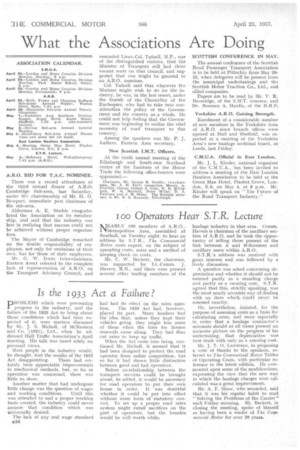Is the 1933 Act a Failure ?.
Page 50

If you've noticed an error in this article please click here to report it so we can fix it.
PROBLEMS which were preventing progress in the industry, and the failure of the 1933 Act to bring about those conditions which had been expected of it, were matters discussed by Mr. J. S. Nicholl, of McNamara and Co. (1921), Ltd., when he addressed Hull Traffic Association's April meeting. His talk was based solely on personal views.
Most people in the industry would, he thought, find the results of the 1933
Act disappointing. There had certainly been appreciable improvements in mechanical methods, but, so far as operation was concerned, there was little to show.
Another matter that had undergone little change was the question of wages and working conditions. Until this was attended to and a proper working basis created, the industry could never assume that condition which was universally desired.
The lack of any real wage standard B16 had had its effect on the rates ques tion. The 1933 Act had, however, played its part. Many hauliers had the idea that, unless they kept their vehicles going, they might lose some of them when the time for licence renewals came along. They had thus cut rates to keep up traffic.
When the Act came into being, continued Mr. Nicholl, it seemed that it had been designed to protect the road operator from unfair competition, but so far it had shown little distinction between good and bad operators.
Before co-relationship between the transport services .could be brought about, he added, it would be necessary for road operators to • put their own house in order. It was doubtful whether it could be put into effect without some form of statutory control. To set up a proper road rates system might entail sacrifices on the part of operators, but the benefits would be well worth while.




























































































